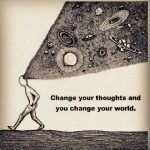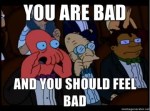 Sometimes conversations make me laugh when they shouldn’t. Call it a weird sense of macabre humor.
Sometimes conversations make me laugh when they shouldn’t. Call it a weird sense of macabre humor.
I was having a conversation with a friend of mine who I’ve confided in about my eating disorder, one of those chatty, meandering, mostly pointless conversations that you’d have with any friend. I don’t remember exactly what she said, but at one point she looked at me, horrified, and gasped, “Oh my gosh, I’m so sorry! I hope I didn’t just trigger you!”
I looked at her and laughed. “Kid,” I said, “if I wanted to avoid everything that triggers me, I’d never be able to get out of bed in the morning. I deal.”
Like all dark humor, there’s truth to this. If I wanted to avoid everything that reminded me of my eating disorder or made me feel uncomfortable about my weight and my appearance, I’d have to invest in a lobotomy. (Which doesn’t sound like the best of all ideas, considering the only lobotomy I really know involves getting impaled through the prefrontal cortex with a piece of railroad track… Thanks, Psych 101.)
What I’m finding now is that my eating disorder has been so entrenched in so many parts of my life for so long that it’s turning the most random things into triggers. Foods I used to eat when I was restricting more severely, certain clothes I used to be able to wear and can’t anymore, songs I used to listen to when I exercised, even specific smells can send me off onto a mental tangent that I don’t particularly want to be on. It doesn’t have to be significant; it just has to connect to something in my head. Neurons are weird that way.
There are times when I’m a little ashamed of my triggers, which I realize is pretty much the definition of a vicious cycle. When you start feeling bad about feeling bad, there’s really nowhere to go from there. But I’m not proud that there are people I don’t even know that trigger me when I see them walking around my campus, because they wear the same size I did before I started recovery.
This is not helpful. No. I know that. But it happens.
What I’m coming to realize, and what I hope can be helpful for other people dealing with unavoidable triggers, is that these things are always going to be there. There will always be somebody working out more than I am, losing weight when I’ve forbidden myself to, engaging in behaviors that would be unhealthy for me at the present moment. And, most likely, this will continue to set me on edge for a while.
Will the feeling go away? Will I be able to amble around the world with my head in the clouds, never being bothered by the disordered eating and super-health-conscious behaviors (side note: even though they both trigger me some, diets and eating disorders are not the same thing!) around me? Honestly, probably not.
But I can control, and am controlling, how these things affect me.
I still see my “trigger people” (as I uncharitably call them) and feel a little bad and miss the days when I weighed less than I do now. But that doesn’t mean I have to act on these feelings. I can allow myself a few minutes to feel sorry for myself, and then continue on with my day.
And most importantly, I can stop going looking for triggers.
Self-triggering doesn’t just have to be pro-ana or pro-mia websites, or Thinspiration Tumblrs, or websites promulgating the diet industry. If you’d like to read more about these phenomena (I’d call them travesties and blights on humanity, but I don’t want to get melodramatic), check out the links I’ve included. We all know that thinspo and pro-ana sites are terrible for people in recovery. No shocking news there.
But some of the other things I used to use to trigger myself on purpose aren’t quite so obvious. A few years ago, when I wanted to indulge my eating disorder, I would spend hours trolling the Internet and the public library for eating disorder literature. I know, I know, this seems counterintuitive. But I stocked up on body image websites, eating disorder recovery blogs, and ED fiction in the young adult section. I read Wintergirls, I read How I Live Now, I read Thin…
If it was in the YA section of the library and mentioned eating disorders, I read it.
I’m planning on doing a post about ED fiction sometime in the near future, but I don’t want to go off on too big of a tangent here. For now, suffice it to say that depending on your stage of recovery, indulging your eating disorder by allowing thoughts about it to take up all of your free time is not the way to go.
There are so many other wonderful things we can do with our lives.

Image via Sex with Timaree
Now, when I start to feel myself getting triggered by the people and foods and sights and sounds and smells around me, I’m not going to give in so easy. I’ll give myself about five minutes to feel sorry for myself, if it’s a particularly bad day. But my action plan is to throw myself into doing something else. Instead of watching True Life: I Have an Eating Disorder (don’t watch this if you’re in recovery, it was a terrible idea), I’ve had so many more productive experiences. For example:
I’m working an online internship.
I’ve written a novel
I practice Ashtanga yoga.
I’ve knitted about seven hats since January.
I’m actually making progress on my Goodreads “to-read” shelf. (Halfway through Gone With the Wind, in case you’re keeping tabs)
And that’s not even counting the little monotonous everyday things that I actually have time to take care of now. Triggers will always be there, and they often leap out at us when we least expect it. But we don’t have to take it lying down.
What do you think? Are there certain situations in which you have trouble dealing with triggers? Do you have suggestions for coping strategies that you’d like to share with others? Pass it along in the comments.
In the meantime, there’s a half-finished hat lying on my dresser, and I have five episodes left of Firefly waiting for me on DVD. Now there’s a coping strategy.

Reblogged this on vadercdotcom and commented:
That sounds interesting
I think you’ve got a good strategy there, and is similar to what I do (even though the triggers are for something different). Something will pop up when you least expect it, and take you right back to your darkest places. But I acknowledge it, and then try to get on with something else before the thought takes hold. Years later there are still triggers in my life, but they get fewer and much less powerful as time goes on. The best way to beat them is to keep living your life as fully as possible, and not to hide from them
Great post!
For me, I reach out to a friend for help. Like today, I texted my friend for clarification about an off the cuff comment he made – I told him what Ed’s interpretation was and then I told him mine and asked him which he meant.
Of course, he sided with me and not Ed. (No one says the mean things Ed says to me anymore.)
You are awesome and I love your writing, thanks for sharing 🙂
I am really just starting on the journey of identifying triggers for comfort eating. I don’t have anorexia or bulimia and I have been fortunate enough to avoid these conditions. However, I do have other weight related illnesses. (Diabetes and Polycystic Ovary Syndrome) I have recently been reading a lot of blogs and finding that regardless of the name of your weight related condition a lot of the feelings and triggers are similar. I would not dream to say they are the same, because we are all different.
I am finding reading and writing blogs a superb outlet and would recommend it for anyone.
Wonderfully written. Some days it seems as though triggers are flying out of every nook and cranny of the universe, and on those days, I distance myself from Debbie Downer thoughts by writing. Occasionally, I admit that I just mope about with the triggers in mind like a huddle of grumpy hippopotamuses in a muddy pond, but even these days are beneficial; they alert me that I have some inward thinking to do, and some needs to attend to. P.s. Post a picture of your hats!
Jayne hats for everyone!
I just watched that episode this afternoon! Yesssssssss Jayne hats 🙂 Although that’s slightly out of my knitting skill range…
Interesting thoughts, I have food issues but although i have been to anorexia and back it was brief and not deeply ingrained. However I suffer from depression and now consider myself in recovery. There are triggers all around that I must recognise and deal with so all you have written here still applies. Its a psychological issue that is more universal than you may think.